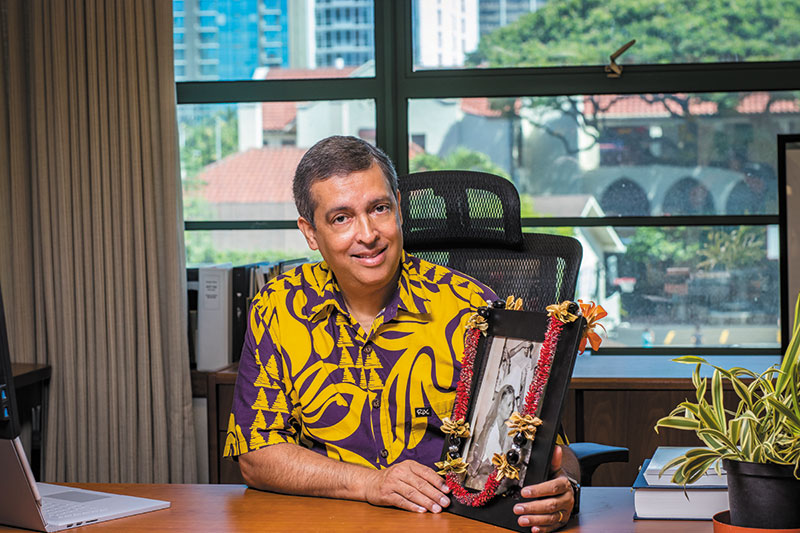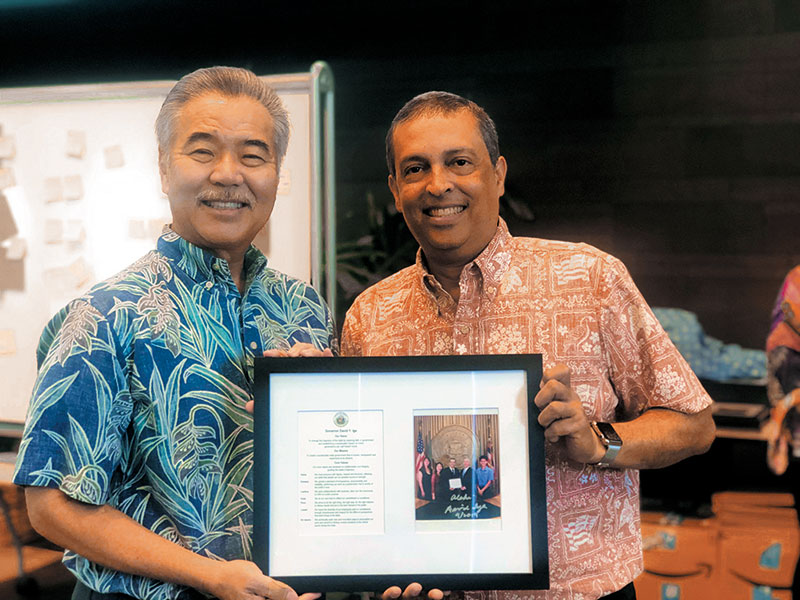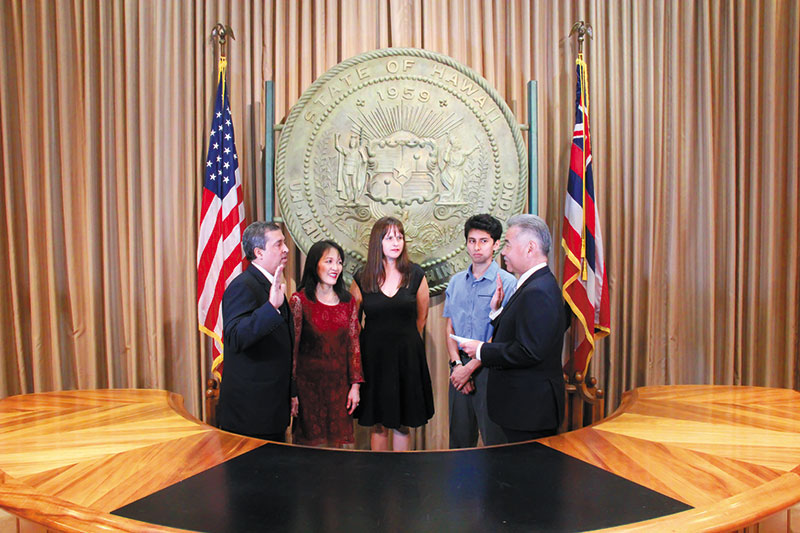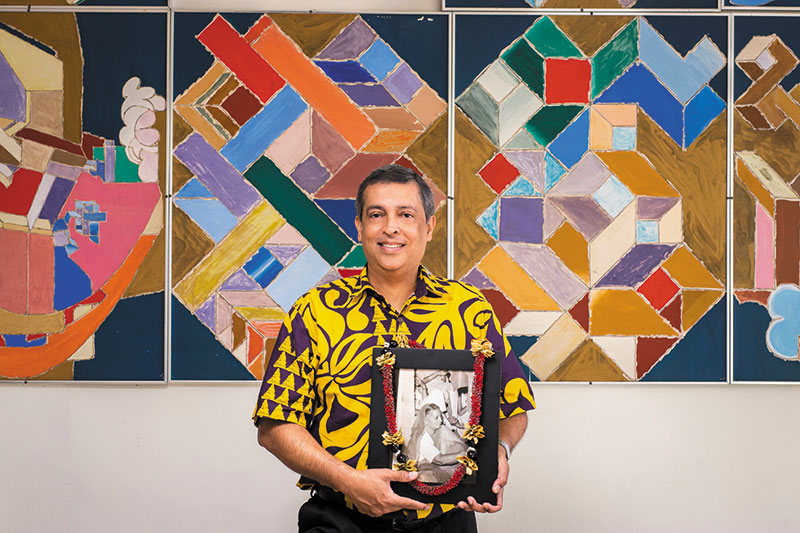A Promise Fulfilled

As his 21-year career at Hawai‘i Department of Human Services comes to a close, director Pankaj Bhanot reflects on a life dedicated to serving others, and a decades-old commitment he made to his grandmother.
On his 14th birthday, Pankaj Bhanot made a promise to his grandma that he would dedicate himself to public service through civil service, with the sole purpose of making other people’s lives better.
In his 21-year-career at the state Department of Human Services, including the last four as director, he was able to not only fulfill that promise, but also help hundreds of thousands of Hawai‘i residents in vulnerable situations. Those beneficiaries have taken advantage of a number of agency programs, including child welfare and adult protective services, and food/financial and medical insurance assistance.
Now, Bhanot has decided to leave his position because of personal health and family issues. He was actually planning to resign at the beginning of the year, but because of the COVID-19 crisis, he chose to stay and usher the department through these unprecedented times. And, despite the challenges ahead, Bhanot has complete confidence in the team he leaves behind.

Pankaj with (from left) son Satya Nicholas Sokei-Bhanot, wife Lynn Reiko Bhanot and mom Shashi Bhanot. PHOTOS COURTESY PANKAJ BHANOT
“The department is in very good shape,” he says, noting his last day on the job is Aug. 31. “It is a well-oiled machine at this point that can withstand any rigor and challenge, no matter what it is.
“We have smart, sharp, committed staff across the board in place for this department to continue to be very successful.”
Before the economy shut down and thousands of people throughout the state lost their jobs, DHS anticipated the flood of applications for food and medical insurance assistance, and began making preparations.
From April 26 to July 24, the department received 20,445 applications for SNAP (supplemental nutrition assistance program) and financial benefits, of which 19,657 were approved. The average time to process an application was two days, and the average time to receive a new EBT card was two to three days (a replacement EBT card took three to five days).

Pankaj Bhanot was appointed director of the state Department of Human Services by Gov. David Ige
For Med-QUEST/Medicaid, there were 38,123 newly enrolled individuals from March to July, a 35 percent increase from the same time last year (28,191 newly enrolled individuals). Total enrollment was 364,169 on July 26 compared to 332,613 on July 27, 2019 — a nearly 9.5 percent increase, with an average processing time of one to two days.
In addition, the department made sure childcare centers for essential employees and first responders remained open.
“When we started to hear chirps of COVID-19 on the continent and what was happening in China and other places and cruise ships, I summoned our executive team and said guys, we need to plan now, not tomorrow, not when ordinances or emergency proclamations are gonna be issued,” shares Bhanot. “We were already talking about it in this department in the third, fourth week of February. I instructed all our executive leadership across the whole department to start working with their federal partners and to have every single federal policy either waived or suspended that may become a barrier to expediting the benefits and services to our residents. I said you guys don’t have an option. I want every hand on deck, and they swung into action.
“That is ‘Ohana Nui. That is aloha spirit. That is our commitment to our constitutional mandate.”
Born and raised in Jalandhar, India, Bhanot comes from a family of lawyers, educators and farmers. The oldest of four, it was his duty to be a positive role model for his two younger brothers and sister.

Bhanot took his oath of office with wife Lynn Reiko Bhanot, secretary Veronica Cheong and son Satya Nicholas Sokei-Bhanot by his side.
His dad was a reputable lawyer, and his mom earned a master’s degree in instrumental and vocal music, but gave up her career dreams to raise her children. In India, they were among the Brahmins of society (upper class), but suddenly life threw a curveball and the family became homeless.
“My father was a brilliant man, the finest legal mind I have ever met in my life,” says Bhanot, whose father passed away in 1995. “But his endless and over dependence on alcohol almost destroyed our family. He didn’t have control on his temper; he physically and mentally became abusive.”
Bhanot recalls his family moving to Delhi to stay with different relatives, although the six members were often split up between homes. The lifestyle was particularly challenging for the children, who would never know where they would be sleeping from night to night, or if their parents would be with them.
“It (upsets) me that people in our community have the audacity to question poverty,” says Bhanot, as he recalls those tough times. “To question that people, that the DHS is … giving out handouts, wasting money, glorifying poverty — it’s a bunch of crap.
“They have no idea what poverty is. They have read it in books, but they have never gone through it. Poverty has very different faces. We were from a very reputable family, a very educated family.”
Bhanot credits his mom for persevering through the difficult circumstances and for the sacrifices she made for their future.
Despite the struggles, Bhanot never forgot his promise to his grandma. He went on to graduate from law school in Delhi, moved to the United States and obtained his master’s at Cornell Law School, and continued post-graduate studies in international law, with a particular focus on the rights of migrant workers and their families. Eventually, he made his way to Hawai‘i as the family development director at Kaua‘i Economic Opportunity, and then joined DHS as an emergency hire in September 1999.
Bhanot was named Employee of the Year for DHS in 2006, Manager of the Year for both the state and DHS in 2013, and became the first person out of the civil services ranks to become the director of human services in 2016. Last year, he was recognized as the State Outstanding Member of the Year by the American Public Human Services Association.
“Pankaj consistently used his position to enhance the common good,” notes Gov. David Ige, who has appointed Cathy Betts to serve as DHS director starting Sept. 1. “He recognized needs and sought to resolve them. He offered hope and provided ways for people to achieve a better life for themselves and their families.
“He did this by focusing on the whole family and addressing the root causes of poverty. Using the ‘Ohana Nui framework he was able to tackle the social determinants of health and well-being. He built partnerships with community groups, and he built the internal capacity of the department by providing professional development opportunities for the staff.”
When Bhanot leaves DHS, he intends to get some much-needed self-care, including for a back injury he suffered while on a trip to Japan with wife Lynn last November. He also is looking forward to spending more time with his mom, who turns 82 in October.
“I am very proud of my son for following the advice of his grandmother (Shakuntala Prashar) and fulfilling the promise he made to her,” shares his mother, Shashi Bhanot. “Pankaj is able to achieve personal and professional success in spite of many hardships we faced as a family.
“It is his self-belief, discipline, sheer will to succeed, pursuit of education and professional excellence, and promise to his grandmother to pursue a career in public service to make a difference in the lives of others, made him reach the top of his profession.
“As his mother, what more can I ask for? I am overwhelmed with pride and love. I am sure Grandma is smiling and showering all her love and affection at him from her heavenly abode.”
DHS DEDICATED TO HELP
For those who have been impacted by the ongoing coronavirus pandemic, director Pankaj Bhanot offers this reminder: DHS is here to help. Whether it’s childcare, food/financial or medical insurance assistance, he advises people to apply.
“Please do not conduct your own eligibility based on online information and what people tell you,” he says. “Let us do that. If you’re not eligible, we will tell you. Don’t just do it yourself and determine yourself to be uneligible because you might be not correct.”
For more information on Med-QUEST, visit medquest.hawaii.gov. For SNAP/financial assistance, visit humanservices.hawaii.gov.
“As the Aloha Spirit statute says, aloha is the essence of relationships in which each person is important to every other person for collective existence,” adds Bhanot. “We are interdependent and if that is true, we are all in this together. We are ‘Ohana Nui-strong. We will get through this, believe me.”






